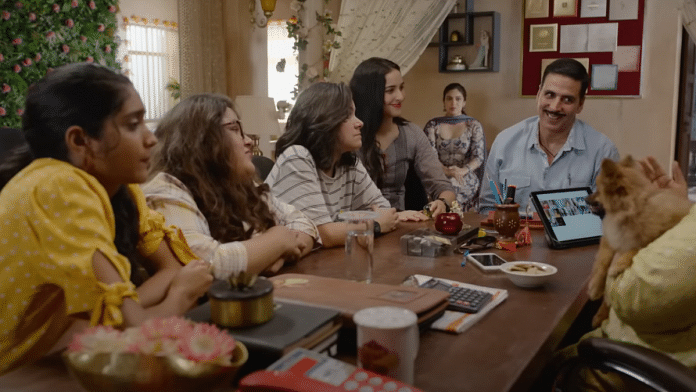The good news is that Akshay Kumar’s Raksha Bandhan doesn’t serve nationalism on a platter as many of his movies do — the recently released Samrat Prithviraj tanked at the box office. The bad news is that it is a dramedy — drama cum comedy — attempting to do so much in a 110-minute run that it often fails to connect with the audience. But as director Aanand L. Rai’s strength goes, Raksha Bandhan is loaded with emotional moments and circumstantial comedy.
The film is set in the busy streets of Chandni Chowk in Old Delhi, an area Akshay Kumar lived and grew up in before moving to Mumbai. In Raksha Bandhan, Lala Kedarnath (Akshay Kumar) runs a chaat shop that he inherited from his father. He has been in love with Sapna (Bhumi Pednekar) since childhood but he cannot marry her until he gets his four younger sisters married, owing to a promise he made to his mother before she died. Lala is equal parts brother and father figure to his sisters, barring Gayatri (Sadia Khateeb) who is ‘sarva guna sampanna’ or as Lala describes her often — “Yeh mera sabse honhaar bachcha hai (She is my most promising child)”. Gayatri is fair, demure, wears ethnic clothes and performs all domestic chores impressively.
Lala’s other sisters are representatives of three broader types that Indian society or, in this case, the film labels as ‘no marriage material’ — one has a wheatish complexion, another is overweight, and the youngest one is a tomboy. The film revolves around Lala’s struggles and efforts to get his daughters married.
Social commentary on dowry
Raksha Bandhan has released theatrically on the same day as the festival. The film aims to touch upon the traditional sibling bond wherein the onus to protect and be responsible for a woman often falls on her brother. Lala is no exception. He goes to extreme lengths to fulfil his promise and duty.
In one scene, a social worker gathers people in the congested streets of Old Delhi to raise awareness about dowry. She appeals to the citizens to not give dowry when they get their daughters or sisters married, to which Lala asks if she has children. The social worker says that she has two daughters. “Agar aapke do bete hote toh aap yeh nahi bol rahi hoti (If you had two sons, you wouldn’t have been saying this),” responds Lala. He goes on to say that till the time people keep asking for dowry (quintessentially, the groom’s family), the bride’s side will have to give it.
After a turning point in the film, Lala’s deep-rooted notions about dowry dramatically change and he proclaims that he would make his sisters capable enough to take dowry instead of giving it. That, at best, sends out a dubious feminist message.
Dowry remains to be a continuing and salient problem among many Indian families and abroad as well. The suicide of Mandeep Kaur, a 30-year-old Indian woman living in New York, on 3 August, is a reminder of how deeply ingrained the problem is, even in the 21st century.
Also read: Rajesh M, Venkat Prabhu bring dark comedy to SonyLiv’s Victim, challenge you to rethink
Akshay Kumar and the supporting cast
Akshay Kumar is a quintessential performer — that has always been his strength, be it in emotional or comic situations. In Raksha Bandhan, he embodies the character of Lala with ease — often too performative and on the nose — and on most occasions, he delivers.
The first half of the film is uncomfortable to watch as he taunts his sisters about their weight, complexion, and mannerisms — all in the guise of fitting them into traditional ideas and becoming ‘acceptable enough’ to get married. But one turning point in the plot changes his mindset and outlook toward his sisters.
Pednekar’s role is not typically central to the movie, but whatever little she is provided with, she does it well. The rest of the cast, comprising Sadia Khateeb, Sahejmeen Kaur, Deepika Khanna, and Smrithi Srikanth, are fine additions. Regardless of how problematic Seema Pahwa’s character is, but she, even in a guest appearance, is always a delight to watch.
In a recent interview, director Rai said, “I don’t know how much it will be liked. But I do know that nobody can dislike it.” I agree. Judging from the cinematic lens, the film has several flaws, but it is difficult to not connect with the emotions — as is the case with most of Rai’s films.
(Edited by Humra Laeeq)



